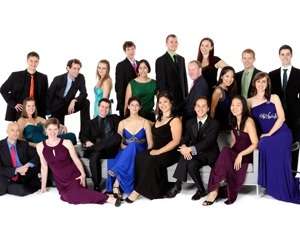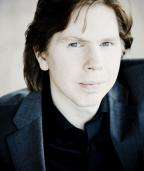|
Back
Messiaen’s Heavenly Length New York
Zankel Hall, Carnegie Hall
03/19/2013 -
Olivier Messiaen: Des canyons aux étoiles...
Juho Pohjonen (Piano), Laura Weiner (Horn), Ian Sullivan (Xylorimba), Jared Soldiviero (Glockenspiel)
Ensemble ACJW, Robert Spano (Conductor)

ACJW (© Jennifer Taylor)
Twice in the past two weeks, Robert Spano has conducted a rare and variegated orchestral force in an extremely difficult, extremely long piece of music. His leadership of Osvaldo Golijov’s La Pasión según San Marcos was a tour de force, but the Latin rhythms, the complexity and largeness of conception was an instinctive crowd-pleaser.
Last night, he had a more difficult job: taking Olivier Messiaen’s complex homage to America, “From the Canyons to the Stars”–actually to the Western parts of America, to Zion and Bryce national parks, to the birds and rocks and stars above the park–and make those 90 minutes stay alive the whole time.
But Mr. Spano had some immaculate help here. The ACJW Ensemble, a sometimes ad hoc group of young musicians were, as always, alert, vibrant and technically brilliant. His soloists we come to later. But Messiaen’s strange choices of keyed percussion and one French horn were...well, wonderful.
The work had been played here a few years ago in the hall to which it was dedicated, Alice Tully Hall (Ms. Tully had commissioned the piece for America’s bicentennial.) This was the Carnegie Hall debut, and the venue had gone out of its way to make the work palatable. Along with the program was a colorful four-page brochure dividing Messiaen’s piece into “Birds”, “Rocks” and “Stars”, That was far too simple for the composer’s intricate interplay of avian, geological and religious format. But still, it was nice that when the piano played the “mockingbird” cadenza, we saw the picture of a mockingbird. That when Messiaen gave a synesthetic picture of the colors in Bryce Canyon, we saw a picture of the composer in Bryce Canyon. A rare sight, taken from the Olivier Messiaen Foundation Archives.
One would have thought that the twelve sections of the work might have been wearing. But the three kids sitting in front of me, none older than 10, were absolutely entranced. They didn’t need that brochure, for they could hear the bird sounds coming from the glockenspiel and modified marimba. They were astounded at the different tintinnabulations of the other percussion. And at those rare times when Messiaen wrote for strings alone (uniquely consonant), they relished these perhaps religious litanies.

J. Pohjonen (© Marco Borggreve)
They were certainly astounded–as I was–by the young Finnish pianist Juho Pohjonen. His two solo cadenzas with their crashing chords, their misdirected silences, their percussive splashing up and down the keyboard, frequently bringing a birdsong from the tones, were brilliant intermezzi from the orchestral playing.
Not to say that Laura Weiner’s horn cadenza was not astounding by itself. The “Interstellar Call” movement was a thesaurus of horn sounds. Ian Sullivan’s “xylorimba” and Jared Soldiviero’s glockenspiel had no cadenzas, but the entire work was accented by them, and at times, as in the climax, Messiaen’s geographic and religious “Zion” they let themselves go wild.
The last time this was played, David Robertson and the Juilliard Orchestra gave it a sensual veneer, a kinetic projection that was deeply poetic. Robert Spano’s conducting was more mathematical, more concerned with the structure, the commanding series of sounds.
Yet so gorgeous was Messiaen’s vision–of the geology, the sounds of nature, and the stars above park which, to him, were the essence of God’s creation–that no single conductor can hope to capture Messiaen’s everlasting, always renewing Epiphany of life itself. When I heard this then, I had no choice but to relate this music to the poetry of another Catholic artist, Gerard Manley Hopkins, whose own love of earth and heavens was never mawkish, sentimental, or ceremonial, whose “hound of Heaven” could have been equivalent to Messiaen’s birds of paradise.
That comparison still holds. The fabric Messiaen created is too complex to inhale in one hearing. The second hearing gave more indications of its greatness, but hopefully it will be played again and again, for this, in theme and duration, is indeed of “heavenly” length.
Harry Rolnick
|